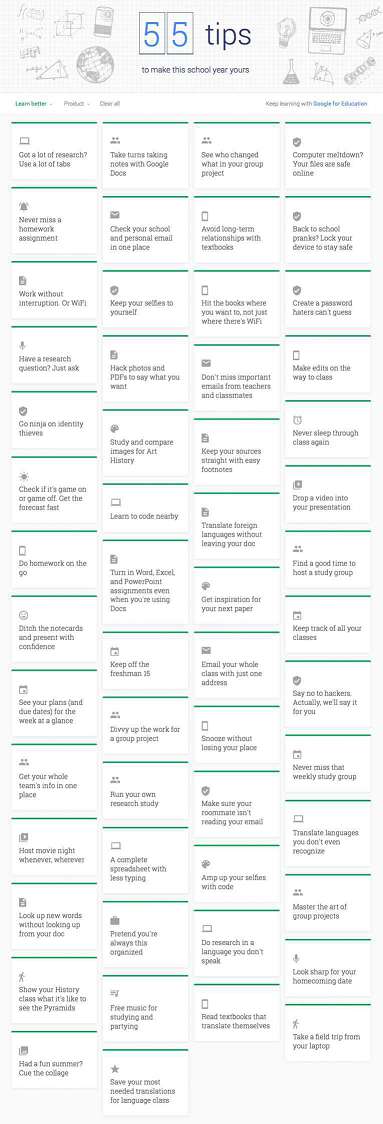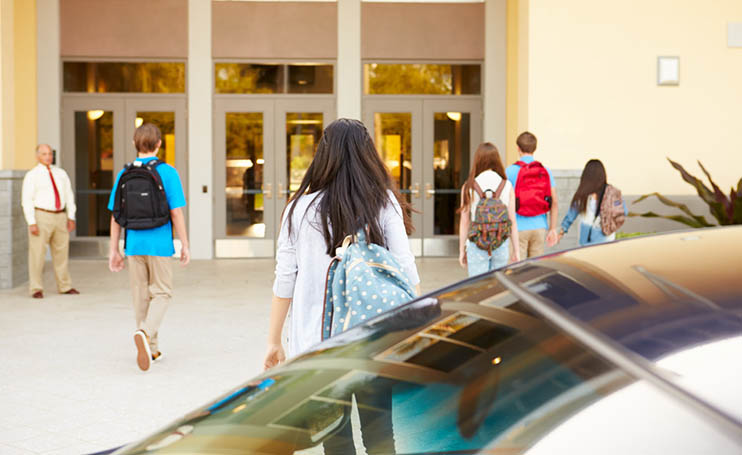Starting the School Year Off the Right Way
As the summer draws to a close, both children and their parents begin to think about preparing for the school year ahead. There are always supplies and clothes to be purchased and plans to make for a successful academic experience.
After all, the slate is clean – no matter what the past year brought in terms of classes and grades, this year offers the promise of being equally good or better. Make sure you know how to prepare for school so you can take the school year head on!
Students, Take Note

Students can help themselves, setting a positive tone for the year, by following a few tips set forth by Gabrielle Flank, writing for the Huffington Post.
- Be organized. Ensure that you have the notebooks and writing implements you need to get your work done and stay organized.
- Plan ahead. Between homework assignments, extracurricular activities and, for some, part-time jobs, it may be challenging to keep track of obligations. Keeping a calendar listing all your meetings and deadlines will help you with time management, the key to juggling your various responsibilities.
- Build homework into your daily schedule. If you set aside time for homework, over time it will become a habit. Procrastination is a student’s enemy, so keep on top of your assignments. Considering adding an online tutoring program to enhance your study time. Or say, schedule in time try out math problems so you get regular math practice.
- Communicate with your teachers. You need to know your teachers’ expectations for your progress so that you can work toward those goals. They want you to succeed, so asking questions or seeking help should be welcomed.
- Understand your learning style. People can be classified as auditory, visual or kinesthetic learners. Know how you learn best and adjust your studying style accordingly.
Parents and School

School is a large part of any offspring’s life from age five onward. For parents, overseeing a student’s journey becomes one of your missions. Every parent undoubtedly wants his/her children to enjoy learning and to succeed at school, but when problems arise, these good intentions often fly out the window as frustration takes over.
It’s important for parents to think through their own educational philosophy and the educational expectations they have for their children and to convey so that everyone is in accord and you can help foster success, says www.newyorkmetroparents.com.
Assess your own philosophy about education. Take a hard look at your own values. What matters to you about your children’s education? Why is school important? How do you define success in school? Once you understand your own philosophy, share it with your children. This is only between you and your child for now, the teachers aren’t involved at this point.
Now, move on and consider your expectations for the school year. Think about the things you want your children to achieve this coming year and how those achievements are measured. Do you expect A’s on every test? Are you hoping to see hard work and diligence? What are the qualitative and quantitative standards to which you’ll hold your children accountable?
Once you’ve set your expectations, you must ensure that your children understand them, too, and knows the consequences for not meeting these expectations. Children appreciate knowing the rules and boundaries, even if they test them. Be firm and consistent, but not unfair or cruel.
Laying Groundwork for Success

Once you and your children are clear on goals and expectations, it’s a part of your responsibility as a parent to provide the conditions that facilitate success. Identify his or her strengths and weaknesses in terms of academics. Discuss time management and the importance of keeping commitments. This is also the perfect time to talk about the factors that are conducive to your child’s success, including:
Rest:
- Proper amount of sleep
- Bedtimes
Eating:
- Nutrition, eating habits
- Meal times
Environment:
- Work space
- Lighting
- Noise
- Distractions
Timing
Exercise:
- Study breaks
- Extracurricular activities
Once you have a sense of what will work and what won’t, it’s time to draw up a contract. Yes — a contract for success. It should clearly state the results you expect; the child’s responsibilities; the support and oversight you will provide; a rewards/consequences system based on efforts and results; and a way to adjust the contract as your child changes and expectations change. Both you should sign it and move forward toward academic success.
Caveats
Your support is invaluable to your children as they strive for success at school. This means avoiding negative feedback whenever possible, recognizing that you are helping to inspire a love of learning and good study habits that can last a lifetime. Sidestep the following pitfalls whenever you can:
- Criticism that is harsh or unexplained – be diplomatic if you must deliver criticism
- Inauthentic praise – look for actual positives to compliment instead, even if they are small
- Talking to your child’s teacher without giving your child a head’s up – he or she deserves to be treated with courtesy and respect, despite his or her youth
- Doing your child’s homework – they need to try and even fail on their own; effort and ownership is important. No one will be there to run their lives for them as they grow up. Instead, perhaps opt for a tutor who can help guide them. For example, a math tutor can give your child the proper math help they need without simply giving them the answers.
These tips are good for whether you want to figure out how to prepare for high school or college. After all, preparing for college will build on what you’ve learned in high school! So, start the school year off with a bit of forethought and it should unfold with only minor bumps along the way!
How to Get Ready for High School

For most students getting out of middle school, the prospect of high school can be rather intimidating due to the increased academic demands and the social obstacles that may hinder a lot of kids from enjoying those four years.
In order to smooth that transition and help make the high school experience not just bearable but actually enjoyable, some preparation must be undertaken to help with that.
Some may think that it’s not entirely necessary, and they may be right, but every bit of good does count in the end when everything is accounted for. It does not hurt to be a bit more diligent, and it does help to be ready for whatever may come in high school.
There are four major factors involved in proper high school prep, and here are some of the best ideas for each.
Studying

Of course, the biggest part of preparing for high school is learning how to study properly. You might think that this should already be established by the time you get out of middle school, but it does help to refine and reassess one’s study habits before high school, which is when academic expectations start getting ramped up.
Being able to have a good study space with little to no distractions, ample lighting, and comfortable surroundings is a necessity. It could be anywhere in the house, whether it’s in one’s own room, in the kitchen, at the living room, or so on.
The most important factor to a good study space is to be able to focus entirely on the studying while you are there. You can’t do math questions if there are loud distractions or not enough light to read your textbook.
Once you have your study space, you must then organize everything to make sure that your studying is as seamless as possible. Perhaps put a table lamp on the side to be able to read and see everything on the table. You may also need some pens, pencils, erasers, paper, ruler, notepad, and other supplies.
Whatever it may be, make sure that you have everything you need right there once you’re about to study. Nothing is worse than missing something and having to look for it when you’re supposed to be studying.
Mental Preparation and Coming to Terms with Social Norms in High School
The key to getting through high school is positive thinking. Whether you’re worried about your studies, your extracurricular activities, or what people are saying about you, it’s best to look straight ahead and be able to see the silver lining throughout the whole time.
This is a big thing for anyone going to high school since those four years are more than just about getting good grades. If it were just about academic achievement, then we would not be talking so much about high school in the first place. For most people, their difficulties in high school are not academic but social.
It is absolutely important to maintain a healthy social life by having a group of friends you know you can trust even at the worst of times in school. This is invaluable as it can mean the difference between high school being okay and being like hell for you.
Planning for the Future
As high school is the bridge between childhood and college, that’s a good time to consider what you want to do in the future, whether you are going to college to take up a specific major or do something else. For most people at this time, they aren’t sure of what to they really want to do for the rest of their life.
It’s normal to be indecisive about one’s future during this time, and it’s important to keep your options open and explore whatever you could to understand where your true passion lies. The default options you have are to go to college and take up a degree that suits you best, as well as different courses that can help you learn the skills you may need in the future.
You may also want to look into financial assistance programs if you are planning to go to college. There are number of options available, and they get even better if you’re either a scholar or a star athlete. However you end up, it would be nice to have some help to get you through college and through your introduction to adulthood.
If you’re a parent and worried that your teen might not be ready for high school, you might also want to try this quiz from About.com.
55 Back to School Tips from Google
The 2015 school year has just started, and many students are surely both excited as well as worried on how well they’ll do in their studies for the entire year.
Fortunately, there are tons of web tools these days that can really be useful for students to further improve their learning experience.
One of them is Google, probably the biggest technology innovator of this generation and a leader for pretty much everything over the web, including edtech tools (see Google for Education).
Google has recently launched an interactive back to school checklist of tips that students from all over the globe can utilize to make studying & learning less difficult – and fun at the same time. Let’s take a look at how to get ready for school!

55 Back to School Tips from Google for Education
- Translate foreign languages without leaving your doc
- Divvy up the work for a group project
- Drop a video into your presentation
- Email your whole class with just one address
- Turn in Word, Excel, and PowerPoint assignments even when you’re using Docs
- Never sleep through class again
- Don’t miss important emails from teachers and classmates
- Make edits on the way to class
- Say no to hackers. Actually, we’ll say it for you
- Make sure your roommate isn’t reading your email
- Translate languages you don’t even recognize
- Snooze without losing your place
- Look up new words without looking up from your doc
- Do research in a language you don’t speak
- Amp up your selfies with code
- Host movie night whenever, wherever
- Look sharp for your homecoming date
- Master the art of group projects
- Free music for studying and partying
- Show your History class what it’s like to see the Pyramids
- Take a field trip from your laptop
- Read textbooks that translate themselves
- Save your most needed translations for language class
- Had a fun summer? Cue the collage
- Check if it’s game on or game off. Get the forecast fast
- Learn to code nearby
- Do homework on the go
- Hack photos and PDFs to say what you want
- Go ninja on identity thieves
- Keep your sources straight with easy footnotes
- A complete spreadsheet with less typing
- Run your own research study
- Ditch the note-cards and present with confidence
- Get your whole team’s info in one place
- Find a good time to host a study group
- Pretend you’re always this organized
- Study and compare images for Art History
- Get inspiration for your next paper
- Keep track of all your classes
- Keep off the freshman 15
- Never miss that weekly study group
- See your plans (and due dates) for the week at a glance
- Got a lot of research? Use a lot of tabs
- See who changed what in your group project
- Keep your selfies to yourself
- Never miss a homework assignment
- Back to school pranks? Lock your device to stay safe
- Work without interruption. Or WiFi
- Check your school and personal email in one place
- Hit the books where you want to, not just where there’s WiFi
- Take turns taking notes with Google Docs
- Create a password haters can’t guess
- Have a research question? Just ask
- Computer meltdown? Your files are safe online
- Avoid long-term relationships with textbooks
101 Ways to Be More Productive During Summer Vacation
While you’re on break in between school years, it would be wise to spend that time productively through one or several of these 100 good things that can be done during your summer vacation. There’s a lot of options for things to do before going to school again!
Rest and relax:
- Power down and destress.
- Catch up on movies, shows, or games.
- Fix your sleep schedule.
- Hang out with your friends.
- Engage in a relaxing hobby.
- Listen to some relaxing music.
- Make some art.
- Take your dog for a walk.
- Learn how to meditate.
- Find a quiet spot in town where you can reflect.
Help out:
- Do household chores.
- Help in cleaning up your neighborhood.
- Offer neighbors to do chores and errands for them.
- Join a volunteer outreach program.
- Read for the blind and dyslexic.
- Volunteer in an retirement home.
- Knit or crochet for babies and pets.
- Deliver meals to clients or the needy.
- Look after younger family members and relatives.
- Give your pets a bath.
Travel:
- Tour the countryside.
- Go camping, hiking, and/or backpacking.
- Become an exchange student.
- Visit your out-of-town or overseas friends and family.
- Work abroad.
- Make good use of your student status and get discounts to tours.
- Book an educational tour.
- Get into couch surfing.
- Visit a zoo and/or aquarium.
- Volunteer abroad.
Gain more knowledge:
- Read some books from cover to cover.
- Do writing exercises.
- Learn how to cook.
- Practice a musical instrument.
- Learn a new language.
- Attend summer school.
- Visit museums.
- Visit historical sites.
- Take online courses. We have some great math videos!
- Watch online university lectures.
- Make something with your own hands.
- Study in advance or get a tutor for subjects you’re having a hard time.
Earn and learn about money:
- Look for an internship or a part-time job.
- Open a bank account.
- Learn how to manage your money.
- Start looking into different ways of investing money.
- Think of business ideas.
- Start a small business.
- Learn how to do your own taxes.
- Read up on the stock market.
- Research on foreign exchange.
- Look up financial scams and learn how to avoid them.
Prepare for school and your future:
- Look at next school year’s curriculum.
- Browse your text books.
- Look at colleges and majors.
- Browse job markets.
- Write down your goals and future aspirations.
- Rule out things that you don’t like.
- Work to discover your true passion. Taking a look at back to school activities might help.
- Figure out how to make your passion profitable.
- Work on your resume or curriculum vitae.
Challenge yourself:
- Dig up an old to-do list and complete it.
- Clean your whole living space.
- Write a novel.
- Produce a short film.
- Research your family history.
- Eat healthier.
- Get into a regular workout routine.
- Work towards some physical milestones (workout and go to the gym).
- Train and join a race.
- Take up swimming and other water sports.
- Climb a mountain.
- Get into a martial art.
- Quit bad habits.
Work on your own professional brand while you’re still young:
- Start a blog.
- Clean up your social media.
- Take more pictures and create a photo diary.
- Practice your public speaking skills.
- Make videos and upload them online.
- Start your own podcast.
- Learn about online marketing.
- Build your portfolio.
Help Mother Nature:
- Plant your own garden.
- Don’t drive; walk or ride a bike.
- Make your own compost heap.
- Recycle old stuff to make new stuff.
- Help groups with planting trees.
- Volunteer to help take care of rescued animals.
- Work at an organic farm.
Become a better person:
- Decide to become a better person. This is always the first step.
- Make amends with estranged friends and family.
- Make a habit of thanking others.
- Turn a weakness into a strength.
- Look for a mentor.
- Be a mentor.
- Find ways to get motivated.
- Master time management.
- Become more organized.
- Count your blessings and be grateful for what you have.
- Become gracious in your victories.
- Learn how to come to terms with your failures.
We hope your back to school prep goes smoothly! If you want to get started on math either during your summer holiday or as a supplement to your new math classes, check out studypug.com. You’ll get to see if online tutoring works for you!












